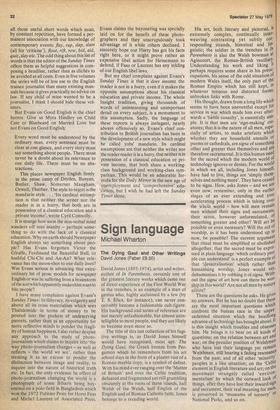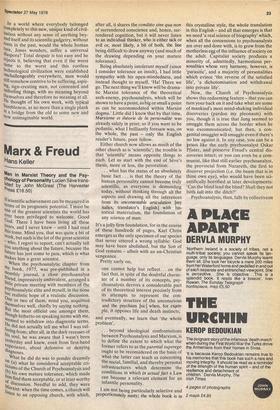Sign language
Michael Wharton
The Dying Gaul and Other Writings David Jones (Faber £8.50)
David Jones (1895-1974), artist and writer, author of In Parenthesis, certainly one of the greatest literary works which came out of direct experience of the First World War in the trenches, is an example of a man of genius who, highly acclaimed by a few (by T. S. Eliot, for instance), can never conceivably become a fashionable cult-figure. His background and terms of reference are not merely unfashionable, but almost unintelligible to most people, and they are likely to become even more so.
The title of this last collection of his fugitive writings is, as David Jones himself would have recognised, most apt. The Dying Gaul, the Greek bronze from Pergamon which he remembers from his art school days in the form of a plaster cast of a Roman marble copy, is a symbol of defeat. With his mind ever ranging over the 'Matter of Britain' and over the Celtic tradition, defeated and fragmented yet still grumbling obscurely at the roots of these islands, half Welsh of the Welsh, half English of the English and of Roman Catholic faith, Jones belongs to a receding world.
His art, both literary and pictorial, is extremely complex, continually inter' weaving contrasting yet subtly cot' responding strands, historical and linguistic; the soldier in the trenches in In Parenthesis is also the Welsh bowman at Agincourt, the Roman-British vexillarY: Understanding his work and liking n perhaps requires some share in his preoecupations, his sense of the odd situation of modern Wales itself, the only part of the Roman Empire which has still kept, In whatever tenuous and distorted forms, unbroken links with Rome.
His thought, drawn from a long life which seems to have been uneventful except for service in war which made him ever afterwards a `battle casualty', is essentially siin
ple. It is that men are 'sign-making' creatures; that it is the nature of all men, espe• cially of artists, to make artefacts which whether they are household utensils or poems or cathedrals, are signa of something other and greater than themselves and nre, therefore sacramental. It is this human nee° for the sacred which the modern world Of technology ignores or denies. For the world
in which we all, including Jones himself, have had to live, things are 'simply thery
selves and nothing more'. They have ceased to be signs. How, asks Jones — and we are even now, remember, only in the earlier stages of an ever extending and ever accelerating process which is taking ove,
the whole world — how Will men remain men without their signs and sacraments, their sense, however unformulated, nf
something greater and other? Will art be possible or even necessary? Will the act of worship, as it has been understood up I°
now, be possible? The current argument, that ritual must be simplified or abolishes'
altogether, that the sacred must be expre'
ssed in plain language 'which ordinary pen; pie can understand' is a perfect example 01
that `desacralisation' which rather than
humanising worship, Jones would saY, dehumanises it by robbing it of signa. With'
out the signa of art how can there be Nor" sbip in this world? Are not all men by nature artists?
These are the questions he asks. He gives no answers. But he has no doubt that these are the most important questions which confront the human race in the unPre" cedented situation which the headlong advance of technology has brought about. It is•this insight which troubles and obsesses, him. He brings it to bear on all kinds 0; questions: on the relation between art 00 war; on the'peculiar position of WelshMen who have lost their language yet rental° Welshmen, still hearing a fading resonane! from the past; and of all other `minoritY,
peoples in a like situation; on the 'Celli° element in English literature and art; on the movement strangely called 'environ'
mentalism' by which the outward look °f things, after they have lost their inward sign and sacrament, their real meaning for Men' is preserved in `museums of scenery' 111 National Parks, and so on. In a world where everybody belonged Completely to this new, unique kind of civilisation without any sense of anything beyond itself and its scientific gadgetry, without toots in the past, would the whole human race, Jones wonders, suffer a universal diaspora? Total despair is too easy and he rejects it, believing that even if the worst canle to the worst and this rootless technological civilization were established unchallengeably everywhere, men would s.till somehow contrive to be suffering, aspiring, sign-creating men, not contented and "feeling things, with no meaning beyond themselves and therefore no meaning at all. lie thought of his own work, with typical humbleness, as no more than a single plank lo a bridge from the old to some new and now unimaginable world.



































 Previous page
Previous page